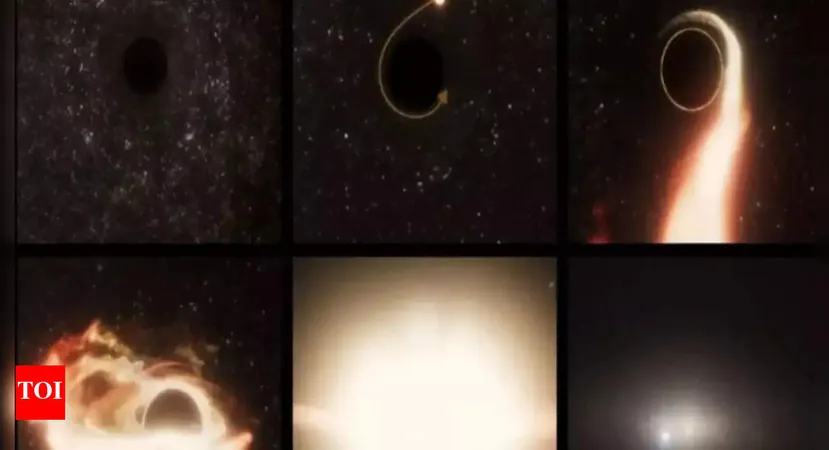
Earth's Cosmic Neighbors: Are We in Danger? NASA Unveils Shocking Discovery of a Star Devoured by a Black Hole!
2025-05-14
Author: Sarah
A Frightening Cosmic Event Unfolds
Astronomers have made a spine-chilling discovery: a supermassive black hole is consuming a star, and it’s happening far from the heart of its galaxy! This extraordinary event, dubbed AT2024tvd, occurred a staggering 600 million light-years away, shattering preconceived notions about where such astronomical disasters can take place.
A Breakthrough in Black Hole Research
For the first time, scientists observed a supermassive black hole devouring a star beyond the central region of its galaxy. This groundbreaking finding upends the long-held belief that such chaos only happens near galactic centers. AT2024tvd marks the first-ever detection of an offset tidal disruption event (TDE) observed by optical sky surveys.
What Exactly is a Tidal Disruption Event?
A Tidal Disruption Event occurs when a star strays too close to a black hole, where it is mercilessly torn apart by intense gravitational forces in a phenomenon known as "spaghettification." This dramatic dismemberment creates shock waves and releases a breathtaking burst of energy and radiation that can be detected across various light wavelengths, from X-rays to visible light.
Unlocking the Mysteries of Wandering Black Holes
The AT2024tvd event, discovered by the Zwicky Transient Facility (ZTF) and later confirmed with the Hubble Space Telescope and Chandra X-ray Observatory, reveals a 'wandering' supermassive black hole, weighing in at about a million solar masses, not residing at the center of its host galaxy. Lead researcher Yuhan Yao emphasized, "This discovery opens up new possibilities for finding this rare population of wandering black holes."
An Explosive Revelation!
During this cosmic feast, the star's demise ignited a stunning flash of light—brighter and hotter than an ordinary supernova! The brightness prompted a flurry of follow-up observations from telescopes around the world, illuminating how black holes can behave far from the confines of their home galaxies. This newly detected event heralds a significant leap in black hole research.
What Do Black Holes Mean for Earth?
Black holes are regions of space with gravitational pulls so fierce that even light cannot escape. Formed from the collapse of massive stars, they are invisible but reveal their presence through their effects on surrounding stars and gas. But should we be worried? While the findings are unsettling, the nearest known black hole is thousands of light-years away—in fact, the rogue black hole from this study is hundreds of millions of light-years from Earth, making it a distant threat.
A New Era in Black Hole Understanding
This unprecedented discovery not only enriches our understanding of black holes but also sets the foundation for exploring these cosmic beasts further. As scientists continue to analyze this event, we eagerly anticipate more revelations about the universe's most mysterious entities. With techniques like TDE detection, the quest to uncover rogue black holes is just beginning!


 Brasil (PT)
Brasil (PT)
 Canada (EN)
Canada (EN)
 Chile (ES)
Chile (ES)
 Česko (CS)
Česko (CS)
 대한민국 (KO)
대한민국 (KO)
 España (ES)
España (ES)
 France (FR)
France (FR)
 Hong Kong (EN)
Hong Kong (EN)
 Italia (IT)
Italia (IT)
 日本 (JA)
日本 (JA)
 Magyarország (HU)
Magyarország (HU)
 Norge (NO)
Norge (NO)
 Polska (PL)
Polska (PL)
 Schweiz (DE)
Schweiz (DE)
 Singapore (EN)
Singapore (EN)
 Sverige (SV)
Sverige (SV)
 Suomi (FI)
Suomi (FI)
 Türkiye (TR)
Türkiye (TR)
 الإمارات العربية المتحدة (AR)
الإمارات العربية المتحدة (AR)